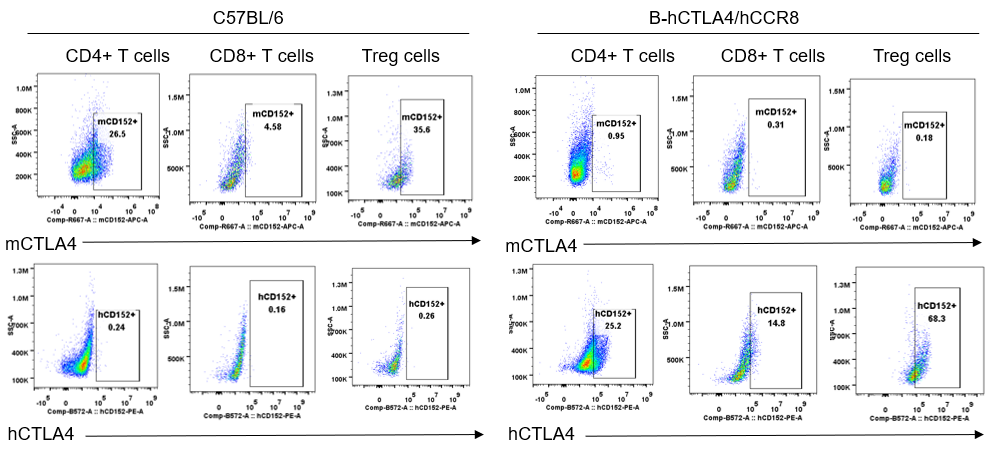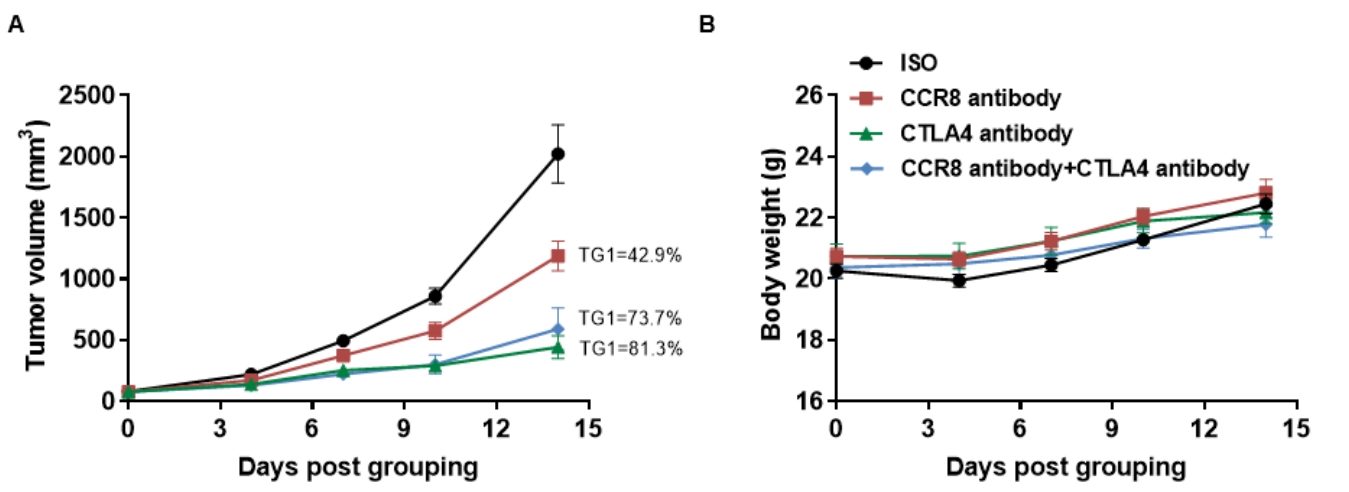Basic Information
-
Targeting strategy

-
Gene targeting strategy for B-hCTLA4/hCCR8 mice. The exon 2 of mouse Ctla4 gene that encode the extracellular domain was replaced by human CTLA4 exon 2 in B-hCTLA4/hCCR8 mice. The exon 2 that encoding the full coding sequence of mouse Ccr8 gene was replaced by exon 2 of human CCR8 gene in B-hCTLA4/hCCR8 mice.
-
Protein expression analysis (spleen)

-

CTLA4 (CD152) protein expression analysis in B-hCTLA4/hCCR8 mice by FACS. Spleen was collected from wild-type mice and homozygous B-hCTLA4/hCCR8 mice stimulated with anti-mouse CD3ε antibody in vivo, and analyzed by flow cytometry with species-specific anti-CTLA4 antibody. Mouse CTLA4 was detectable in wild-type mice. Human CTLA4 was exclusively detectable in homozygous B-hCTLA4/hCCR8 but not in wild-type mice.
-
Protein expression analysis (spleen)

-

CTLA4 (CD152) protein expression analysis in B-hCTLA4/hCCR8 mice by FACS. Spleen was collected from wild-type mice and homozygous B-hCTLA4/hCCR8 mice stimulated with anti-mouse CD3ε antibody, and analyzed by flow cytometry with species-specific anti-CTLA4 antibody. Human CTLA4 was exclusively detectable in homozygous B-hCTLA4/hCCR8 mice. Mouse CTLA4 was exclusively detectable in wild-type C57BL/6 mice.
-
Protein expression analysis (lymph node)

-

CTLA4 (CD152) protein expression analysis in B-hCTLA4/hCCR8 mice by FACS. Lymph node was collected from wild-type mice and homozygous B-hCTLA4/hCCR8 mice stimulated with anti-mouse CD3ε antibody, and analyzed by flow cytometry with species-specific anti-CTLA4 antibody. Mouse CTLA4 was detectable in wild-type mice. Human CTLA4 was exclusively detectable in homozygous B-hCTLA4/hCCR8 but not in wild-type mice.

CTLA4 (CD152) protein expression analysis in B-hCTLA4/hCCR8 mice by FACS. Lymph node was collected from wild-type mice and homozygous B-hCTLA4/hCCR8 mice stimulated with anti-mouse CD3ε antibody, and analyzed by flow cytometry with species-specific anti-CTLA4 antibody. Human CTLA4 was exclusively detectable in homozygous B-hCTLA4/hCCR8 mice. Mouse CTLA4 was exclusively detectable in wild-type C57BL/6 mice.
-
Protein expression analysis (tumor-infiltrating cells)

-

CTLA4 (CD152) protein expression analysis in B-hCTLA4/hCCR8 mice by FACS. Murine colon cancer MC38 cells were subcutaneously implanted into homozygous B-hCTLA4/hCCR8 mice (female, 7 week-old, n=3). Tumor were harvested at tumor volume approximately 400-700 mm3 and analyzed by flow cytometry. Human CTLA4 was detectable in T cells in tumors of homozygous B-hCTLA4/hCCR8 mice.

CCR8 (CD198) protein expression analysis in B-hCTLA4/hCCR8 mice by FACS. Murine colon cancer MC38 cells were subcutaneously implanted into homozygous B-hCTLA4/hCCR8 mice (female, 7 week-old, n=3). Tumor were harvested at tumor volume approximately 400-700 mm3 and analyzed by flow cytometry. Human CCR8 was both detectable in CD4+ T cells and Treg cells in tumors of homozygous B-hCTLA4/hCCR8 mice.
-
In vivo efficacy of combination of anti-human CTLA4 antibody and anti-human CCR8 antibody

-

Antitumor activity of anti-human CCR8 antibody or anti-human CTLA4 antibody in B-hCTLA4/hCCR8 mice. (A) Anti-human CCR8 or CTLA4 antibody or combination of anti-human CTLA4 antibody and anti-human CCR8 antibody inhibited MC38 tumor growth in B-hCTLA4/hCCR8 mice. Murine colon cancer MC38 cells were subcutaneously implanted into homozygous B-hCTLA4/hCCR8 mice (female, 8-week-old, n=9). Mice were grouped when tumor volume reached approximately 80 mm3, at which time they were treated with anti-human CCR8 antibody or anti-human CTLA4 antibody indicated in panel. (B) Body weight changes during treatment. As shown in panel A, anti-human CCR8 or CTLA4 antibody or combination of anti-human CTLA4 antibody and anti-human CCR8 antibody were efficacious in controlling tumor growth in B-hCTLA4/hCCR8 mice. B-hCTLA4/hCCR8 mice provide a powerful preclinical model for in vivo evaluation of anti-human CCR8 and CTLA4 antibody. Valuesare expressed as mean ± SEM. (All data was provided by the client)
-
Summary

-
Protein expression analysis:
- Human CTLA4 was exclusively detectable in T cells of homozygous B-hCTLA4/hCCR8 mice but not in wild-type mice stimulated with anti-mouse CD3ε antibody.
- Human CTLA4 and CCR8 were detectable in tumors infiltrating T cells of homozygous B-hCTLA4/hCCR8 mice but not in wild-type mice.
In vivo efficacious:
The B-hCTLA4/hCCR8 mice can be used to evaluate the efficacy of anti-CTLA4 and anti-CCR8 antibodies.


